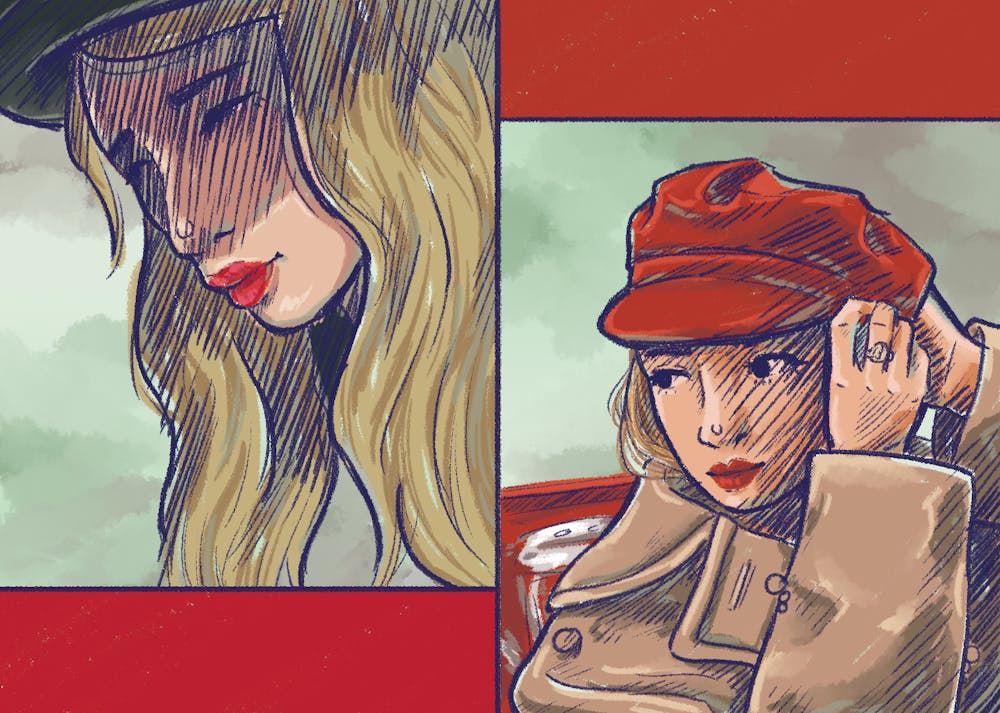From her record-shattering streaming numbers to the economic boosts "The Eras Tour" provides to cities it passes through and the overall success of her album re-recordings, the Taylor Swift fandom's loyalty, dedication and adoration knows no bounds.
But being a fan of one of the most influential people in the world comes with a lot more nuance than one might typically think of when referring to the "Swifties."
Whether it be a scratchy CD of "Taylor Swift," a $1.29 "Red" iTunes track, or any one of her dozens of top-charters playing on the radio, the eras of Swift have been expertly and meticulously documented by her fans over the years.
Here at ASU, the psychology department offers a course on the Swift phenomenon which takes a deep dive into the social psychological aspects of her work, art, and fanbase. The PSY 498 course instructor, Alexandra Wormley, spoke about the different themes covered in the course and how they coincide with the social trends revolving around Swift today.
"The thing she does that nobody else is really doing is all this masterminding, these Easter eggs, playing into the idea that every detail can matter," Wormley said. "When every detail can matter, there's so much room for interpretation and creative thought and scheming within the fandom."
In Wormley's course, Swiftie and non-Swiftie students alike express their opinions and analysis on the fandom and relationships between Swift and her fans. Whether it be from the point of view of a critic or a super-fan, each perspective sheds light on the complex dynamics within Swift's enormous following.
"People are getting so much from her that they're expecting more from her," said Alexis Haenszel, a senior studying management and finance and a Swiftie in the PSY 498 class. "People do expect a lot of her and especially from the Easter eggs. She's admitted she likes to play into it, but I feel like people have taken it to a whole other level."
READ MORE: Taylor Swift's prominence in the NFL world should come as no surprise
Replacing their bedazzled cowboy hats with detective caps, Swifties have been decoding hidden messages in her music videos, social media posts, merchandise drops and website announcements for years now. But with the demand for tickets growing, gatekeeping has run rampant in the Swiftie community who feel newer fans should prove their way into the stadium.
"If you don't know enough songs that aren't singles and if you don't know exactly where she was last weekend, there are some Swifties in the community who may think that you're not an equal Swiftie because you don't keep up in that same aspect," said Madeline Keller, a senior marketing major and Swiftie PSY 498 student.
Swifties to the rescue
Whether you identify as a "Lover" girl or as someone in their "Fearless" era, Swifties attach their identities to the different albums, songs and tracks throughout her career. However, even a shared interest can stir up turmoil when the fanbase faces problematic issues.
Swift has never shied away from public scrutiny. However, in the more recent headlines revolving around Swift’s hefty carbon emissions footprint and her controversial fling with the 1975's frontman Matty Healy, some Swifties have found themselves on the frontlines of online battles as Swift continues her lengthy tour.
"When you're at the level of fame that she is, it's hard for people to remember that you're a complex human and you can make mistakes," Keller said. "People pick and choose their battles because they think she can do no wrong and when you've spent so much time and money and energy on someone like that, you don't want them to do anything wrong. So you justify it in your head and try and justify it to other people.”
Wormley discussed the psychological reasoning behind why Swifties defend these actions, despite not being too certain about their own feelings about it. Online turmoil spilled into real-life discussions trying to approach and dissect Swift’s motivations and what it reflected onto them as fans if they didn’t also address it.
"We had to rectify the fact that Taylor Swift, who we love, is doing something we don't love. So, when it comes to cognitive dissonance, you can do three things. You can change your actions. So you could stop liking Taylor Swift. Very hard to do, right? … You can change your beliefs," Wormley said. "Or, you can change the way you think about your beliefs, your belief perception or your action perception."
Online fans were torn between arguing that Swift shouldn't be held accountable for things her romantic partners have said and done, while others maintained that she held some kind of responsibility for who she spent time with and whether they have the same values as Swift, and subsequently, her fandom.
"Being a very big fan of Taylor Swift, you're more apt to make excuses for her," said Mary Florance, a senior psychology major and non-Swiftie PSY 498 student. "When you're in a romantic relationship, you're going to see past some people's faults."
The Swiftie fandom has a history of flexing its power in numbers. Following a recent encouraging announcement made by Swift about registering to vote, the non-profit Vote.org recorded a surge of over 35,000 new voters. An impressive feat that demonstrated just how coordinated Swifties can be.
However, on the opposite end of that online scale was a post Swift wrote against the Netflix show “Ginny & Georgia” over a supposed "lazy" and "deeply sexist" remark made by a character about Swift's dating life that then prompted thousands of fans to flood the DMs of showrunners and writers in her defense.
"People can go online and, as much as we want to believe we know what happens with her, her relationships or her life, we don't," Haenszel said. "People get very defensive very fast and then attack other fandoms."
Swift has even had to warn fans to leave ex-boyfriend John Mayer alone prior to the upcoming release of "Speak Now (Taylor’s Version)" after the same treatment befell the ex-boyfriend who inspired "All Too Well," Jake Gyllenhaal, during the previous release of "Red (Taylor’s Version)."
"There's a part of identifying with that culture that's so important to people that causes that type of divide," Florance said. "If you believe in Taylor Swift's music being good, and if you endorse her as an artist, then you begin to identify with that community or with Taylor Swift herself too. So that's part of it too because they already have that outgroup perspective, then it feels like a threat to them personally, because it's part of their identity."
When is it too much devotion?
The Swiftie spectrum includes a wide range of fans across different generations and age groups. Some have been listening to her since her debut, and some have just now tuned in for "Midnights." From the hardcore fan pages and "stan" accounts on social media, to your average Spotify listener, the devotion of time and energy to Swift differs on an individual basis.
But when fandom extremism reaches new heights as fans show up to Swift’s recording studio or swarm venues where she’s spotted, it prompts the question many other fans alike must ask themselves: when is it too much?
"At what point does it start to become concerning, whether it's not enough separation between you as a person and this celebrity who you don't really know?" Wormley said. "We can look at a relationship between a fan and a celebrity and as a whole think, 'Okay, something doesn't seem right here.'"
READ MORE: The art of becoming a stan: from One Direction to BTS
There are no defining lines that make up a parasocial relationship, where there’s a power imbalance between a fan who has an infatuation with a celebrity who may not reciprocate those same connections. However, Swift in particular is known to listen to her fans' requests and has even once invited a group of fans to her home.
The rise of celebrity accessibility on social media leads more and more fans to form these types of connections. But, for some Swifties, it is no different from anyone else's fandom or hobby.
"I don't think these fans are any different from any other fandom or any crazier," Wormley said. "It's just what we do, we like to be invested in things, we like to have hobbies. It's perfect, it's wonderful, it's what makes us human."
Edited by Claire van Doren, Jasmine Kabiri and Shane Brennan
Reach the reporter at amvald11@asu.edu and follow @anxieteandbread on X.
Like The State Press on Facebook and follow @statepress on X.

Analisa Valdez is a reporter with the Echo, focusing on covering the arts and entertainment world. Analisa has been apart of the State Press for two and a half years and is in her third year at the Walter Cronkite School of Journalism and Mass Communication.




